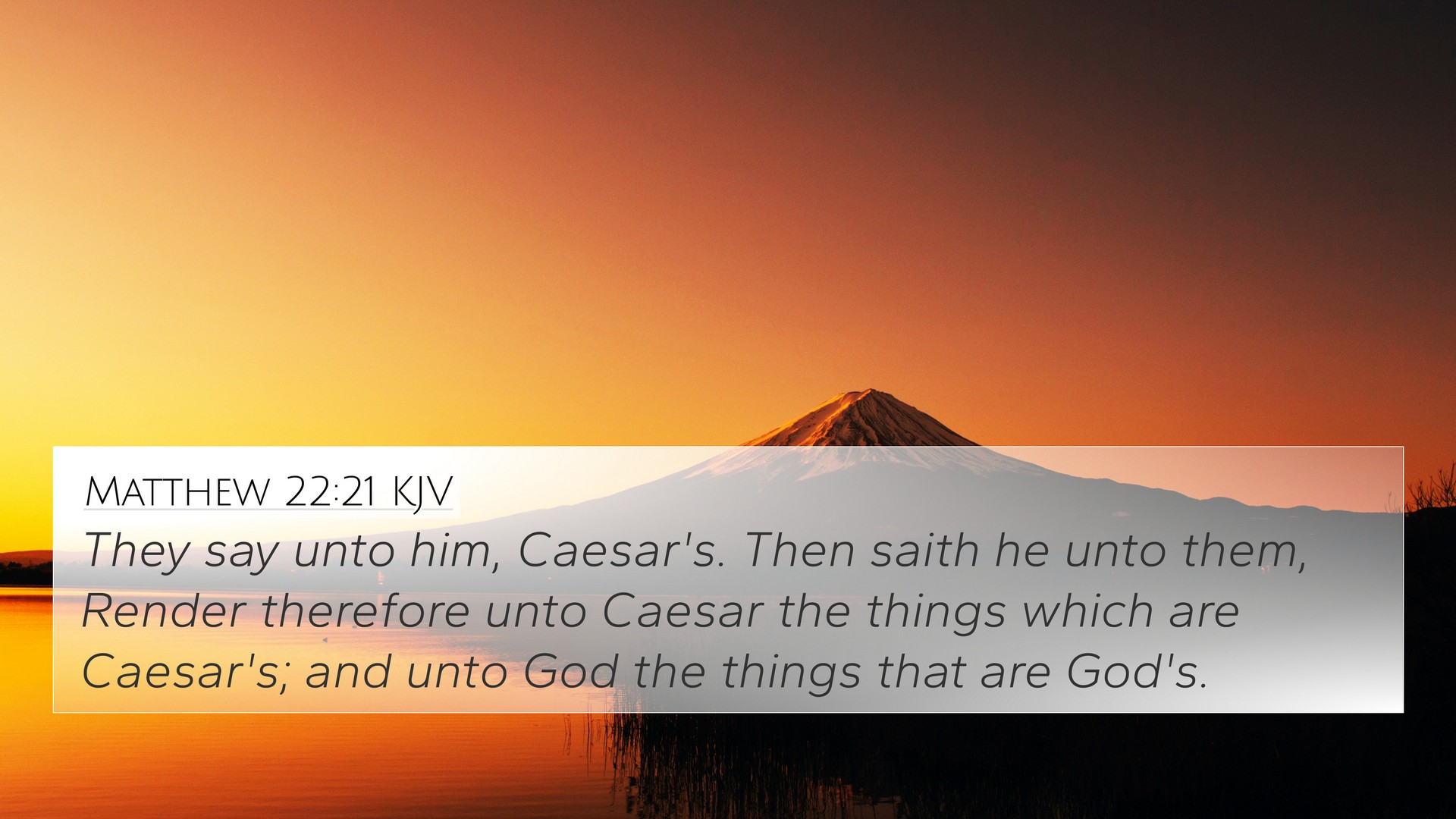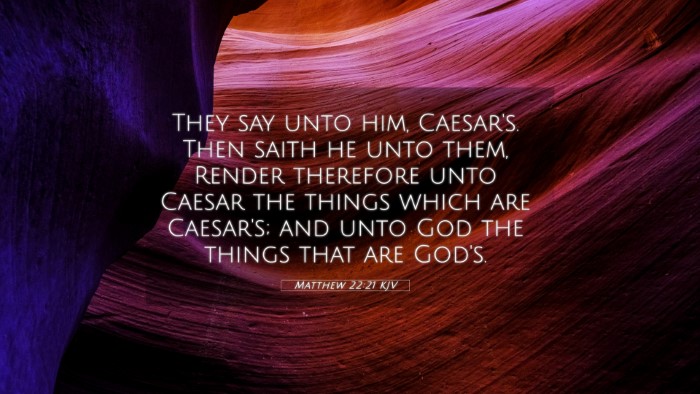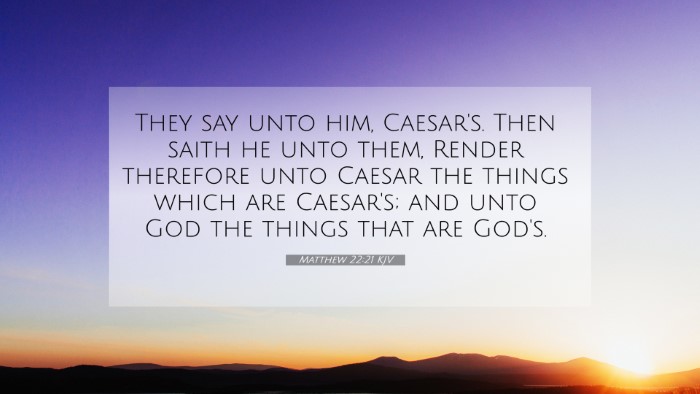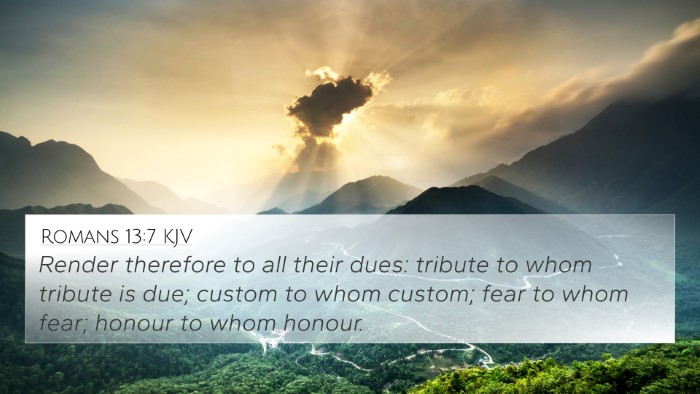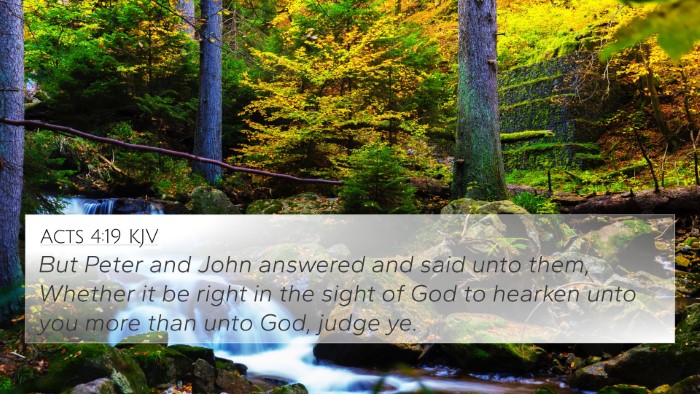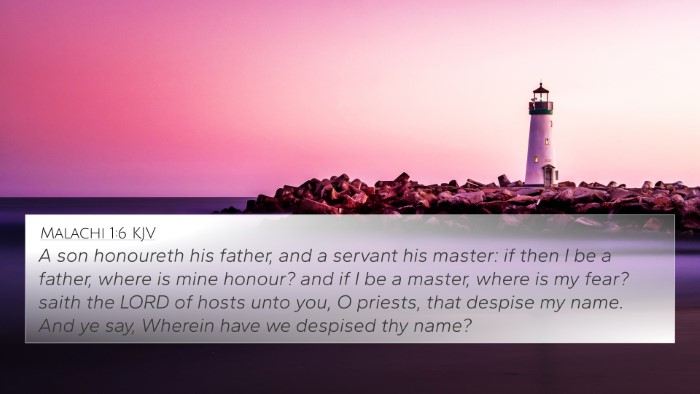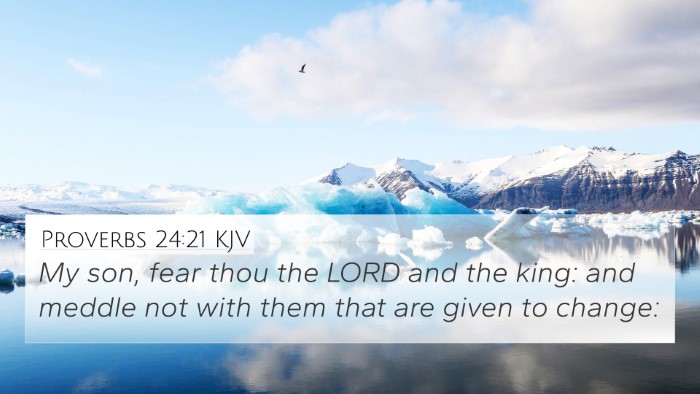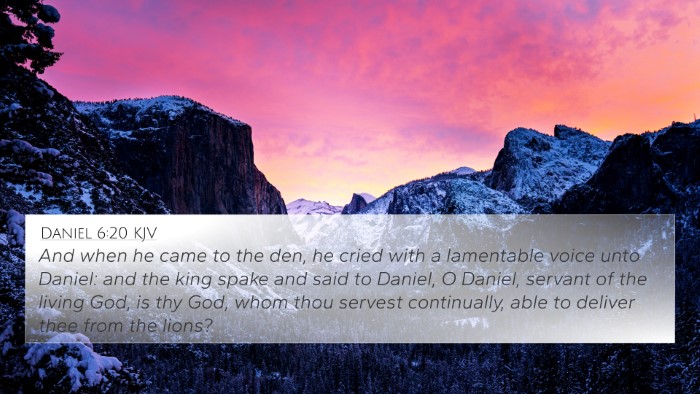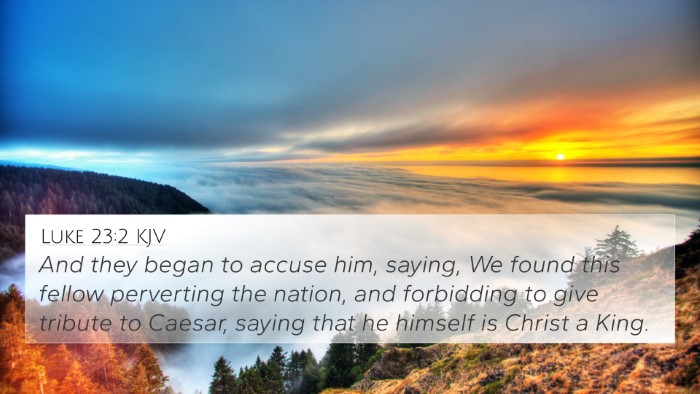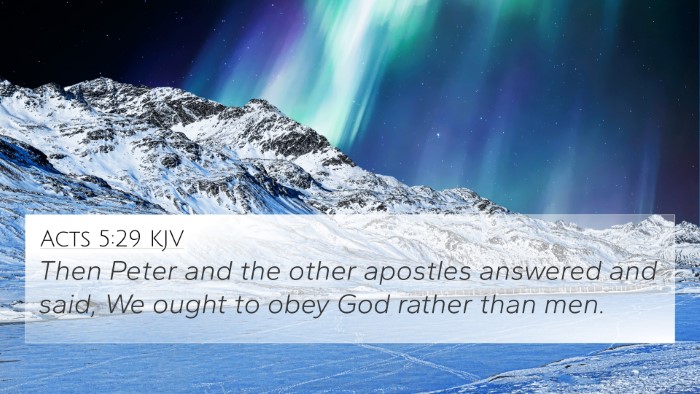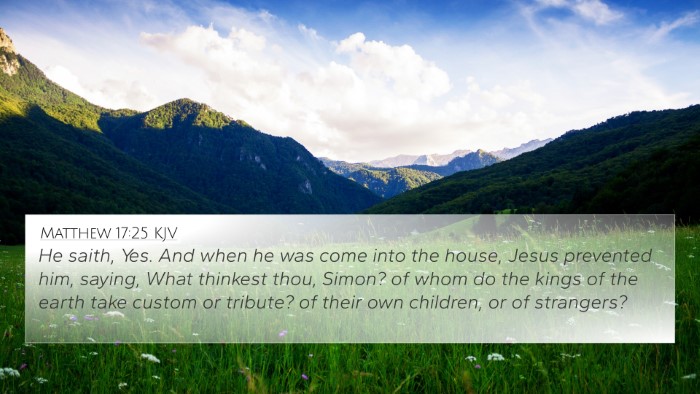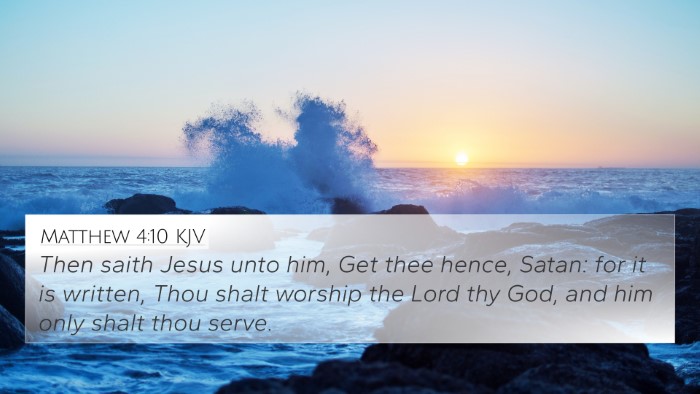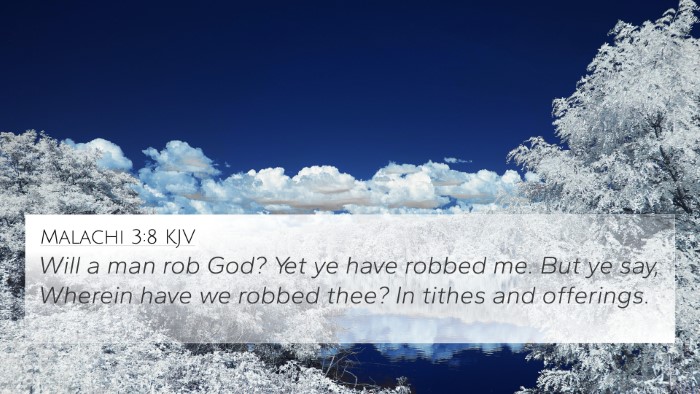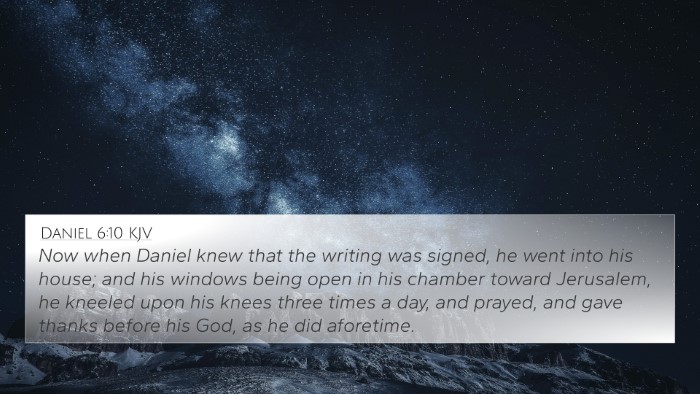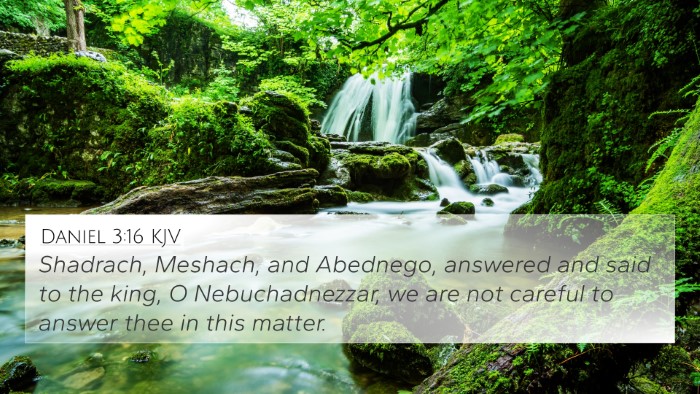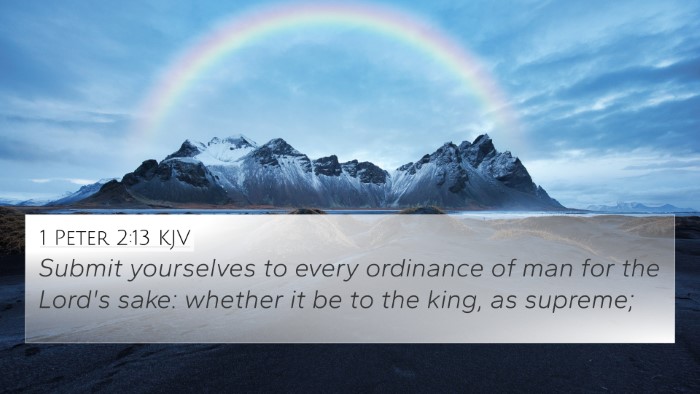Understanding Matthew 22:21
Verse: "They say unto him, Caesar's. Then saith he unto them, Render therefore unto Caesar the things which are Caesar's; and unto God the things that are God's." (Matthew 22:21 KJV)
Summarized Meaning of Matthew 22:21
Matthew 22:21 presents a profound teaching about the relationship between earthly authority and divine obligation. The context of this verse is a challenge posed to Jesus by the Pharisees and Herodians, seeking to trap Him in His words regarding taxation and allegiance. Through His wise response, He emphasizes the dual nature of our responsibilities.
Key Insights from Public Domain Commentaries
-
Matthew Henry:
Henry interprets this passage as Jesus skillfully navigating a trap set for Him. He highlights the necessity of recognizing the legitimate authority of civil governments while maintaining an unwavering commitment to God. Henry emphasizes that both God and government have claims on our lives, and we ought to honor both in their respective spheres.
-
Albert Barnes:
Barnes focuses on the implications of rendering unto Caesar. He illustrates that the acknowledgment of civil authority and the collection of taxes are part of the societal structure ordained by God. Nevertheless, he accentuates that one's spiritual duty—to God—is paramount and must not be overshadowed by the duties to the state.
-
Adam Clarke:
Clarke examines the specific cultural and historical context in which Jesus spoke. He points out that the Jewish people were under Roman occupation, and thus, paying taxes was a contentious issue. Clarke emphasizes that Jesus’ teaching calls for a balance between submission to earthly laws and fidelity to divine commandments, urging believers to recognize the supremacy of God in all affairs.
Related Bible Cross References
- Romans 13:1-7: Discusses submission to governing authorities as ordained by God.
- Mark 12:17: A parallel account where Jesus reiterates the same message on rendering to Caesar.
- Luke 20:25: Similar teaching about obligations to the state and God.
- 1 Peter 2:13-17: Encourages submission to every human authority for the Lord’s sake.
- Matthew 5:20: Highlights the call for righteousness that exceeds that of the scribes and Pharisees.
- Matthew 17:24-27: Jesus talks about paying the temple tax, indicating His own submission to earthly requirements.
- John 18:36: Jesus states that His kingdom is not of this world, pointing to the spiritual realm's priority.
Thematic Bible Verse Connections
This verse serves as a foundational scripture for understanding the intersection of faith and civic duty. The implications extend into various theological dialogues throughout the canon:
- Faith and Politics: How to navigate the often complex relationship between one's faith and political obligations.
- Stewardship: Recognizing that all we have, including our resources, are ultimately from God and to be utilized in His service.
- Authority and Obedience: The balance between obeying God and following earthly authorities, especially when their demands conflict.
- Dual Citizenship: Believers are citizens of both their earthly nation and the Kingdom of God, necessitating an understanding of both responsibilities.
Cross-Referencing Biblical Texts
Utilizing cross-references, one finds rich connections across scriptures that inform our understanding of Matthew 22:21:
- Explore Exodus 20:15 and Romans 13:8 for insights on integrity in matters of civic duty.
- Use Matthew 6:24 as a contrast between serving God versus other worldly ambitions.
- Proverbs 21:1 speaks to the sovereignty of God over the hearts of rulers, reinforcing why we should trust Him over earthly authorities.
- Philippians 3:20 emphasizes our ultimate citizenship in heaven, bridging the ideas of earthly vs. heavenly obligations.
- Bible verses such as Acts 5:29 can be surveyed to discuss the readiness to obey God rather than men when conflict arises in duties.
Final Thoughts
Understanding Matthew 22:21 requires a holistic examination of how Christians can honor their societal responsibilities without compromising their allegiance to God. Employing biblical cross-references and thematic connections enhances the depth of this scripture’s application in both personal and communal faith practice.
Tools for Bible Cross-Referencing
For individuals seeking to delve deeper into Bible verse connections, numerous tools and methods can facilitate effective study:
- Bible Concordance: A comprehensive list to find specific words and their occurrences throughout the Bible.
- Bible Cross-Reference Guide: Useful for identifying direct correlations between verses across different books.
- Bible Chain References: A method that connects verses thematically for deeper understanding.
- Cross-reference Bible Study Methods: Strategies that can help in grouping similar themes and teachings.
